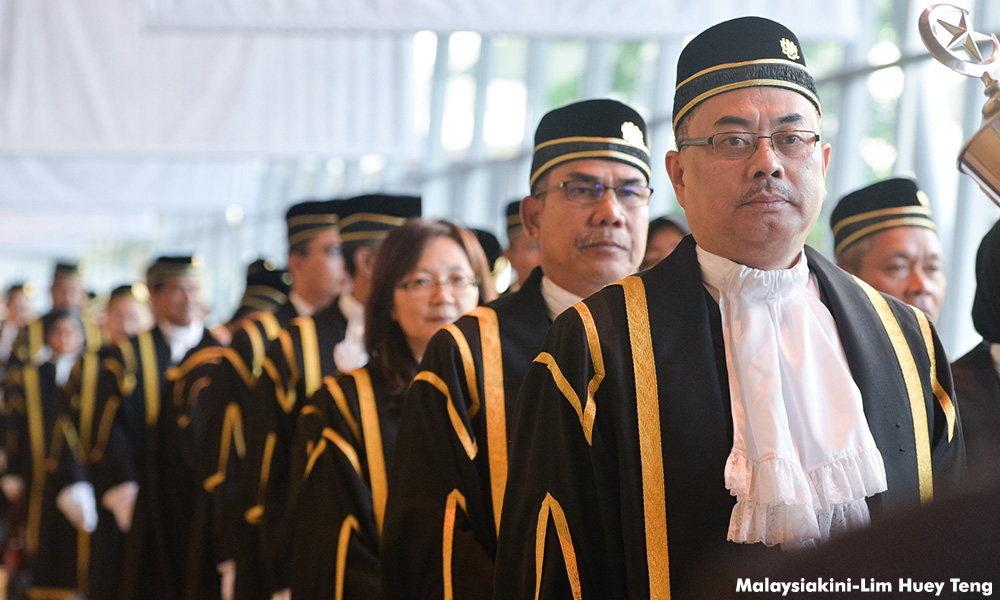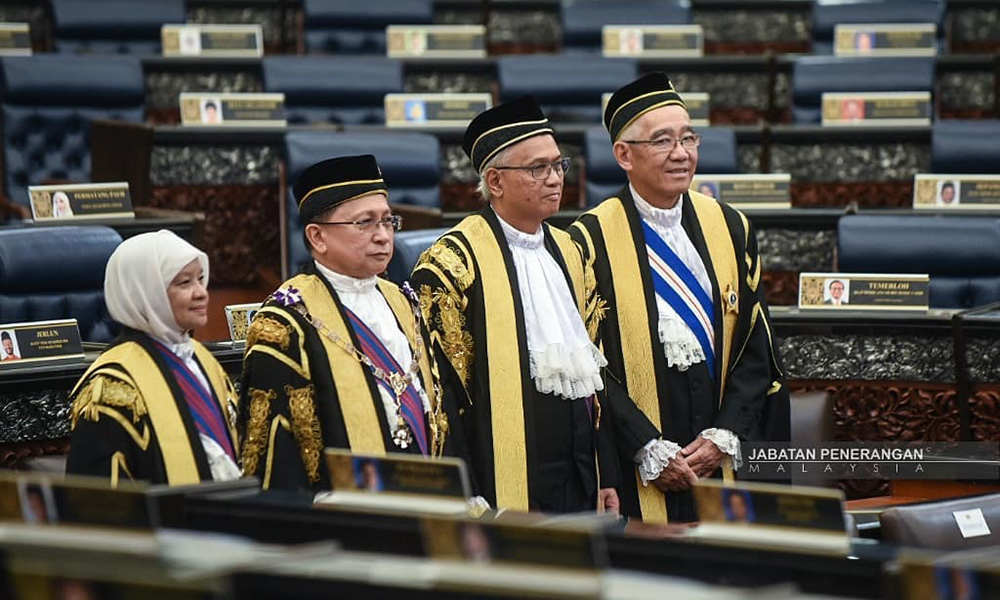COMMENT | The recent revelations by Justice Hamid Sultan Abu Backer and senior lawyer Mohd Haniff Khatri Abdulla about the dismal state of our judiciary are both shocking and troubling to say the least.
It was widely assumed by the legal profession and the public that the rot that had set in after the judicial crisis in 1988 had gradually been arrested in the last decade or so, but the reality seems to be otherwise.
The Bar Council has rightly called for a Royal Commission of Inquiry (RCI) to investigate these allegations and make recommendations to the new government.
But the inquiry should not be limited to just allegations of misfeasance by serving or retired judges. The terms of reference should be wide enough to cover all aspects of the selection, appointment and promotion of judges, their terms and conditions of employment, public funding of the judiciary and issues of governance, integrity and ethics.
As one of the three arms of the government under the constitution, the judiciary should be empowered so that it remains an independent and impartial arbiter of justice, free from all influence of the executive and the legislature. The judicial institution must be open, transparent and accountable to the public.
Judges, their spouses and immediate family members must be made to disclose their assets to Parliament and the MACC. The practice of appointing judges to government-linked companies upon retirement must cease.
Investigations needed
But given the gravity of the allegations being made from within and without the judiciary, it is time that we call a spade a spade.
Certain former holders of high office in the judiciary ought to be investigated for alleged judicial misconduct and impropriety.
Additionally, the public demands to know what was the basis for the appointments of justices Balia Yusof Wahi, Aziah Ali and Mohd Zawawi Salleh to the Federal Court.
Some of these judges have never ruled against the government in their entire careers, let alone entered a vigorous dissent in any public interest litigation cases.
Allegations of judge-fixing have been rampant in the last couple of years. Only an RCI will be able to get to the bottom of this.
As far as the late Karpal Singh's sedition appeal is concerned - justices Mohtarudin Baki and Kamardin Hashim in the Court of Appeal have to explain whether improper pressure was put on them to decide in a particular way, and if so, why they did not resist the alleged unlawful instructions from the senior judge concerned.
Questionable appointments
The recent appointments to the Court of Appeal, done with unholy haste prior to the last general election, has raised serious questions about the suitability of some of the candidates selected.
Why was justice Kamaludin Md Said propelled to the appellate court right after the RCI into the Bank Negara forex losses which implicated the current prime minister Dr Mahathir Mohamad?
Why were senior and highly regarded High Court judges like justices Lau Bee Lan, Yew Jen Kie, Hue Siew Kheng, Lim Chong Fong, M Gunalan, P Ravinthran, Lee Swee Seng, Vazeer Alam Mydin Meera, Azizul Azmi Adnan and Mohd Nazlan Ghazali not elevated to the Court of Appeal?
In the Court of Appeal, Justice Yaacob Md Sam thought that since the former attorney general Apandi Ali found no evidence of wrongdoing by the former prime minister Najib Razak with regard to 1MDB, judicial notice must be taken of a fact not proven but in dispute.
Will the Appeals Court now take judicial notice of the arraignment of former prime minister Najib Abdul Razak for alleged corruption offences in relation to SRC International?
Why was judicial notice not taken of the serious allegations made against Najib by the US Department of Justice in their court filings? Judicial notice can sometimes lead to judicial indiscretion.
Selection of panels
Equally worrying is that in all of the delineation cases involving the Election Commission (EC) prior to the recent general election, only certain judges were empanelled to hear the appeals in the Court of Appeal, namely justices Idrus Harun, Yaacob Md Sam, Vernon Ong, Kamardin Hashim, Zawawi Salleh, Abdul Rahman Sebli, Umi Kalthum Abdul Majid and Hasnah Hashim. Who selected them and why?
How come senior judges like justices Tengku Maimun Tuan Mat, Hamid Sultan, Nallini Pathmanathan, Mary Lim and Rhodzariah Bujang were not selected?
These judges are well-respected and admired for their intellect, integrity and impartiality. They are more deserving of elevation to the Federal Court compared to some of the other judges who are already there.
In all of these cases, the EC had a 100 percent success rate on appeal and the Federal Court declined to grant leave to appeal in every one of them. The appellate bench should explain this seeming anomaly.
Thankfully, it was the voters in the 14th general election and not the judges who saved the country from rack and ruin.
Judges must also be of the right temperament and not become personal in their written judgments. It is unacceptable to be rude to counsel and try to bully them from the bench just because the judge has already made up his mind in favour of one party even before hearing arguments.
The other annoying habit of some judges is to shake their head in disagreement when counsel is submitting. We at the Bar table cannot return this discourtesy since we are required to be polite and decorous at all times.
Another issue that needs to be addressed is where the judge is related to a person who happens to be in the same business or profession as one of the parties in the case.
Judges should also be reminded to stop socialising with politicians, businesspeople and lawyers under any circumstances.
Judges are only required to attend state and national occasions. Private birthdays, weddings, cukur jambul ceremonies (to mark a child’s first haircut) and other festivities, playing golf and tennis do not count as such and should be avoided like the plague.
Revamping the judiciary
Whatever may be the case, these are serious allegations from a senior judge and lawyer that need to be investigated by an RCI. The entire system of appointments and promotions to the bench should be looked at comprehensively.
The Judicial Appointments Commission (JAC) must be revamped to ensure that the judges only get two representatives; the lawyers get three representatives i.e. from West Malaysia, Sabah and Sarawak; the attorney-general gets one representative and three other appointees are from civil society and academia.
At least 50 percent of the judges must come from the practicing Bar and not less than one-third of the judges should be women and from ethnic minorities. This is to ensure diversity, specialised knowledge and experience on the bench.
At present, an overwhelming majority of judges are appointed from the Judicial and Legal Service and some of them still maintain a civil servant’s attitude to the discharge of their duties. There is always a need to be seen to be grateful and appreciative of the government that appointed and promoted them.
This mindset must change. If it does not, then the government should legislate to ensure that the constitution is always given a broad and liberal interpretation and only reasonable and proportionate restrictions are imposed to limit the exercise of fundamental liberties by citizens.
It is time that privative or ouster clauses are removed from all legislation. Access to justice, due process and other fundamental human rights ought to be given constitutional recognition under Articles 5 and 8 of the constitution.
The government must accede to all major international human rights conventions and ensure that our domestic or municipal law conforms to these treaties. Where there is conflict, the treaty obligations shall prevail.
If judges are unable to discharge their constitutional oath of office because of prejudice, bias, religious or political beliefs - or worse, inducements, whether that be financial, pecuniary or proprietary - they should just resign or retire gracefully from the bench rather than be forced out by the government using the cumbersome process of a tribunal under Article 125 of the constitution. Why remain in office to undermine and destroy the constitution, the rule of law and the imperative to do justice?
Stop paying lip service to the law when the heart is in some unholy place. Public confidence in the judiciary is at its lowest. Right-minded lawyers and ordinary persons are going home wondering if the judge was corrupt or biased.
That does not augur well for any country, let alone a country that aspires to be a progressive democracy where the rule of law is not only practiced but is entrenched as an intrinsic and basic human value.
GERARD LOURDESAMY has been practising law for the last 25 years.
The views expressed here are those of the author/contributor and do not necessarily represent the views of Malaysiakini.

